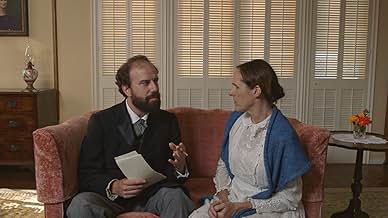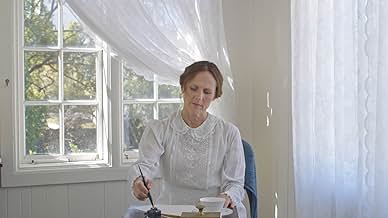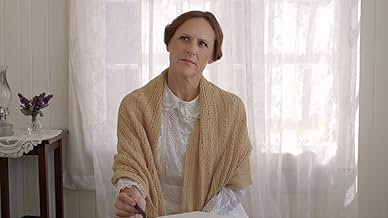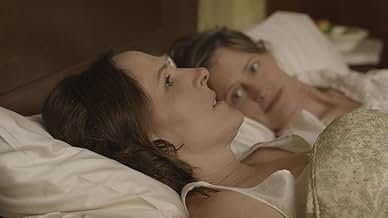IMDb-BEWERTUNG
6,2/10
1511
IHRE BEWERTUNG
Dramatisierung der wenig bekannten Seite des Lebens der Schriftstellerin Emily Dickinson, insbesondere ihrer Beziehung zu einer anderen Frau.Dramatisierung der wenig bekannten Seite des Lebens der Schriftstellerin Emily Dickinson, insbesondere ihrer Beziehung zu einer anderen Frau.Dramatisierung der wenig bekannten Seite des Lebens der Schriftstellerin Emily Dickinson, insbesondere ihrer Beziehung zu einer anderen Frau.
- Auszeichnungen
- 3 Gewinne & 7 Nominierungen insgesamt
Stella Chesnut
- Mattie Dickinson
- (as Stella Chestnut)
John Peña Griswold
- Young Austin
- (as John Griswold)
Empfohlene Bewertungen
This film by Madeline Olken is abit of satire on real life events. Poet, Dickinson was said to have bisexuality as a theme in her poetry. The film delves into her lifestyle within a conservative environment, whilst trying to have a love relationship with her sister-in-law, Susan Dickinson.
This film does well with satire in depicting Dickinson's life. The pace of the film works with the witty humor personified by Molly Shannon's portrayal of the poet. Behind the burgeoning setting, it explores Dickinson as poet trying to assert her writing to a male dominated literary scene.
The film brings light to Dickinson's poetry, which seemed always tragic, misunderstood but questions one's existence. It follows a young relationship between two young women until the death of Dickinson, with devoted caring from Susan.
Although this film has a humorous tone, it takes seriously in how women writers weren't taken seriously or equal to era-related white male authors. The film trys to break down via satire, the mythology that lies behind Dickinson's lifework.
This film does well with satire in depicting Dickinson's life. The pace of the film works with the witty humor personified by Molly Shannon's portrayal of the poet. Behind the burgeoning setting, it explores Dickinson as poet trying to assert her writing to a male dominated literary scene.
The film brings light to Dickinson's poetry, which seemed always tragic, misunderstood but questions one's existence. It follows a young relationship between two young women until the death of Dickinson, with devoted caring from Susan.
Although this film has a humorous tone, it takes seriously in how women writers weren't taken seriously or equal to era-related white male authors. The film trys to break down via satire, the mythology that lies behind Dickinson's lifework.
Wild Nights with Emily (2018) was written and directed by Madeleine Olnek.
It stars Molly Shannon as Emily Dickinson and Susan Ziegler as her sister-in-law, Susan Gilbert Dickinson.
The story comes to us in flashback, as narrated by Mabel Todd, portrayed by Amy Seimetz. Mabel lectures to women's groups, discussing Emily's poems and suggesting to them that Dickinson had a lesbian relationship with Susan.
It's clear that Mabel is a scheming opportunist. However, it's considered highly possible--in the movie and in real life--that Todd is correct.
The plot of the movie revolves almost entirely around the relationship of Emily and Susan. The film works because the actors are so good at presenting us with women in whom you can believe. It's wonderful to see two extremely talented actors bring their characters to life. (In her supporting role, Amy Seimetz does an excellent acting job as well.)
We saw this movie as in the Little Theatre as part of Rochester's ImageOut, the LGBT Film Festival. It will work well on the small screen.
The movie has a fairly weak IMDb rating of 7.0. However, it has been rated by less than 100 people, so it could still climb to a better position. I liked the film and highly recommend it.
It stars Molly Shannon as Emily Dickinson and Susan Ziegler as her sister-in-law, Susan Gilbert Dickinson.
The story comes to us in flashback, as narrated by Mabel Todd, portrayed by Amy Seimetz. Mabel lectures to women's groups, discussing Emily's poems and suggesting to them that Dickinson had a lesbian relationship with Susan.
It's clear that Mabel is a scheming opportunist. However, it's considered highly possible--in the movie and in real life--that Todd is correct.
The plot of the movie revolves almost entirely around the relationship of Emily and Susan. The film works because the actors are so good at presenting us with women in whom you can believe. It's wonderful to see two extremely talented actors bring their characters to life. (In her supporting role, Amy Seimetz does an excellent acting job as well.)
We saw this movie as in the Little Theatre as part of Rochester's ImageOut, the LGBT Film Festival. It will work well on the small screen.
The movie has a fairly weak IMDb rating of 7.0. However, it has been rated by less than 100 people, so it could still climb to a better position. I liked the film and highly recommend it.
"Because I could not stop for death,
He kindly stopped for me." Emily Dickinson
Most cultural historians had pegged Emily Dickinson (Molly Shannon) as about dead long before her time when they depicted her to be shy, reclusive, and virginal. Recent scholarship, upon viewing letters from her to sister-in-law Susan (Susan Zieglar) shows a secret passionate love between the two. Hurray for those of us who suspected that poetic soul had more than death on her mind.
Director/writer Madeleine Olnik bouncily constructs the story with different episodes, some flash backs, to give it the feel, as one critic puts it, of a "Victorian vaudeville." Yes, it has some stock characters, almost winking eyes breaking the wall, and laughable social conventions. More than that, however, it has the roguish tone of a character who is brainy but not above unconventional high-jinx in the love category.
Happily, some of Emily's prose and poetry is run across the screen at appropriate times in the jagged sequence of mildly torrid scenes. In a sense, these are as minimalist like Emily's poetry, suggesting much more than the shots reveal. So be it. A poet suggests and does not report.
Although Wild Nights with Emily is titillatingly titled, the film itself is a rather mild exposition of a similarly mild poet, on the outside, mind you. For us English majors, it's nectar; for the rest, it's entertaining vaudeville.
"Dying is a wild night and a new road." Dickinson
Most cultural historians had pegged Emily Dickinson (Molly Shannon) as about dead long before her time when they depicted her to be shy, reclusive, and virginal. Recent scholarship, upon viewing letters from her to sister-in-law Susan (Susan Zieglar) shows a secret passionate love between the two. Hurray for those of us who suspected that poetic soul had more than death on her mind.
Director/writer Madeleine Olnik bouncily constructs the story with different episodes, some flash backs, to give it the feel, as one critic puts it, of a "Victorian vaudeville." Yes, it has some stock characters, almost winking eyes breaking the wall, and laughable social conventions. More than that, however, it has the roguish tone of a character who is brainy but not above unconventional high-jinx in the love category.
Happily, some of Emily's prose and poetry is run across the screen at appropriate times in the jagged sequence of mildly torrid scenes. In a sense, these are as minimalist like Emily's poetry, suggesting much more than the shots reveal. So be it. A poet suggests and does not report.
Although Wild Nights with Emily is titillatingly titled, the film itself is a rather mild exposition of a similarly mild poet, on the outside, mind you. For us English majors, it's nectar; for the rest, it's entertaining vaudeville.
"Dying is a wild night and a new road." Dickinson
Wild Nights With Emily (2018)
It was like an episode of 'Drunk History' (2013-9).
An awful Americanised period comedy, like a hammed up version of 'Murdoch Mysteries' (2008-) which has always been crazy cheesey anyway.
The timeline jumped all over the place and Molly Shannon showed the diversity that she has always had, that is to say, none.
It was based on the Writer/Directors one woman show and I think that there was too much comedy stage show left in it and not enough time spent converting it to a suitable format for film.
I couldn't get further than the first advert break, because it was just dull, patronising and silly all at the same time. I've seen better, more informative things from the five minute skits on 'Morecambe & Wise'. They were actually funny too!
Unscored as unfinished.
It was like an episode of 'Drunk History' (2013-9).
An awful Americanised period comedy, like a hammed up version of 'Murdoch Mysteries' (2008-) which has always been crazy cheesey anyway.
The timeline jumped all over the place and Molly Shannon showed the diversity that she has always had, that is to say, none.
It was based on the Writer/Directors one woman show and I think that there was too much comedy stage show left in it and not enough time spent converting it to a suitable format for film.
I couldn't get further than the first advert break, because it was just dull, patronising and silly all at the same time. I've seen better, more informative things from the five minute skits on 'Morecambe & Wise'. They were actually funny too!
Unscored as unfinished.
After watching this irreverent yet sincere tribute to poet Emily Dickinson, I had the urge to revisit Julie Harris in "The Belle of Amherst". Call me Old School, but I vastly prefer serious filmmaking to the facetiousness of this feature-length SNL sketch approach.
Certainly SNL alumna Molly Shannon as Emily and Susan Ziegler as her sister-in-law, who share the love that dare not say its name in this version of the Dickinsons story give amusing and often moving performances, but the film has no consistent style or tone, and the male characters are predictably straw men mocked for the self-centered Male Superiority attitudes. Even the movie's unreliable narrator, Mabel (Emily's posthumous editor), well-played by Amy Seimetz, is written with such a heavy hand by filmmaker Madeleine Olnek as to lose substance.
Set in 3 different time frames: 1860 for the main story, 1840 for the young Emily and Susan played by disconcertingly lovely actresses Dana Melanie and Sasha Frolova, and Mabel's current era after Emily's death, wherein she pontificates to packed audiences inflating her role in championing Dickinson's career, the movie unfolds in disconnected scenes, many of which might easily have been dropped for sheer dullness, and a couple of which (surreal in nature) clash with the matter-of-fact overall style. Unlike the usual exaggerated beauty of period movies, typified by everything from Merchant-Ivory classics to Kubrick's "Barry Lyndon", Olnek presents the show as if in a low-budget amateur dress-up production representing 2019.
Use of poetry on screen in subtitles as it is recited (and sometimes by itself) recalls Jim Jarmusch's recent use of same in "Paterson", a techinque I found artificial and forced, just as it seems here too.
Certainly SNL alumna Molly Shannon as Emily and Susan Ziegler as her sister-in-law, who share the love that dare not say its name in this version of the Dickinsons story give amusing and often moving performances, but the film has no consistent style or tone, and the male characters are predictably straw men mocked for the self-centered Male Superiority attitudes. Even the movie's unreliable narrator, Mabel (Emily's posthumous editor), well-played by Amy Seimetz, is written with such a heavy hand by filmmaker Madeleine Olnek as to lose substance.
Set in 3 different time frames: 1860 for the main story, 1840 for the young Emily and Susan played by disconcertingly lovely actresses Dana Melanie and Sasha Frolova, and Mabel's current era after Emily's death, wherein she pontificates to packed audiences inflating her role in championing Dickinson's career, the movie unfolds in disconnected scenes, many of which might easily have been dropped for sheer dullness, and a couple of which (surreal in nature) clash with the matter-of-fact overall style. Unlike the usual exaggerated beauty of period movies, typified by everything from Merchant-Ivory classics to Kubrick's "Barry Lyndon", Olnek presents the show as if in a low-budget amateur dress-up production representing 2019.
Use of poetry on screen in subtitles as it is recited (and sometimes by itself) recalls Jim Jarmusch's recent use of same in "Paterson", a techinque I found artificial and forced, just as it seems here too.
Wusstest du schon
- WissenswertesOriginally performed as a play by the film's director, who extensively researched with support from Harvard University Press and the Guggenheim Foundation.
- PatzerAfter Susan brings the newspaper to show Emily her published poem, she (sarcastically) wishes Emily a Happy Valentine's Day as she exits. In the next shot, a tree with full foliage can be seen out the window. There are definitely no leaves on the trees in Amherst, Massachusetts in mid-February.
- VerbindungenFeatured in MsMojo: Top 10 Best LGBTQ+ Romantic Comedies (2021)
Top-Auswahl
Melde dich zum Bewerten an und greife auf die Watchlist für personalisierte Empfehlungen zu.
Details
- Erscheinungsdatum
- Herkunftsland
- Offizielle Standorte
- Sprache
- Auch bekannt als
- 艾蜜莉夜夜
- Drehorte
- Produktionsfirmen
- Weitere beteiligte Unternehmen bei IMDbPro anzeigen
Box Office
- Bruttoertrag in den USA und Kanada
- 519.487 $
- Eröffnungswochenende in den USA und in Kanada
- 30.209 $
- 14. Apr. 2019
- Weltweiter Bruttoertrag
- 523.982 $
- Laufzeit
- 1 Std. 24 Min.(84 min)
- Farbe
- Sound-Mix
- Seitenverhältnis
- 1.78 : 1
Zu dieser Seite beitragen
Bearbeitung vorschlagen oder fehlenden Inhalt hinzufügen

















